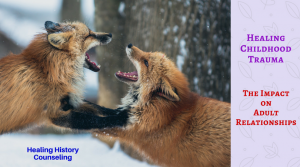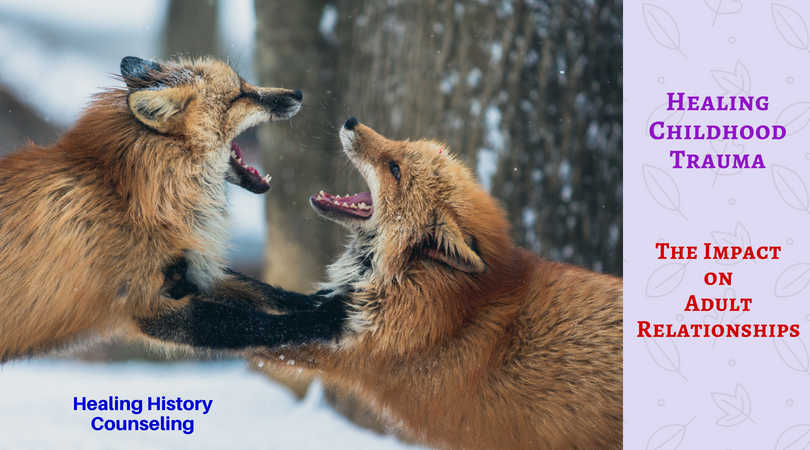

& 5 Ways to Reduce That Impact!
Growing up with trauma or abuse has a huge impact on our adult relationships. Who we pick, how we relate and what we expect are all impacted by the relationships we experienced growing up. We learn how to have a relationship through experience. If we experience safe, healthy and loving relationships growing up we are much more capable of recreating those types of relationships as adults. But it’s more than just how we relate in those relationships. This blog looks at # ways childhood trauma impacts adult relationships.
Ways Childhood Trauma Impacts Adult Relationships
- What we believe we deserve: Growing up in a dysfunctional or harmful home twists how we see ourselves. Often children internalize awful and wrong beliefs about themselves due to their experiences. These awful beliefs may have been stated clearly by others or they may be the deduction made by the child trying to make sense of their experiences. Our belief that we are bad, ugly, awful, unlovable, or any other hateful self-view directly impacts our ability to accept love and compliments. Being truly loved by a caring person can feel wrong, or like a trick or mistake. We can end up rejecting a healthier relationship because we fear they’ll discover their mistake eventually. We can also tolerate or even seek out harmful, unhealthy or unloving relationships because we believe they are the best we deserve or the only people who will accept us.
- Subconscious goals: When we have unresolved childhood trauma, we can end up trying to accomplish goals in our relationships that we don’t even know we’re seeking to achieve. The most common ones are:
- Trying to fix the past: Part of us is always trying to become the best version of ourselves we can. When past trauma is blocking that growth, we can unconsciously put ourselves into situations or relationships that we hope can help us resolve that past trauma. But we usually end up having the same outcome and being disappointed or hurt again.
- Matching Dysfunction: When we grow up in dysfunctional homes we develop the best coping mechanisms we can to succeed in that environment. Unfortunately, those coping mechanisms can become locked in as our adult way of dealing. Since those ways of coping may be decidedly dysfunctional in a healthy relationship, we can end up seeking out relationships where those skills actually work well: with other people who have their own dysfunctional coping skills. Often, they’ll complement each other (a rescuer with someone who wants to be saved). Interestingly, those very complimenting coping skills often become the very thing that frustrates us about our partner.
- Saving: Sometimes our deep wish that someone had saved us from the awfulness of our own experience, or because we were raised in the role of parent or caregiver, we pick people who need to be rescued or taken care of. We are trying to save our child selves by saving them. When we can’t save them, we come to resent their neediness and dependency.
- Filling an unmet need: Growing up unloved, unwanted, or rejected can leave a deep ache inside that cries out to be fixed or filled. We try to find someone who can fill that hole or satisfy that need. Unfortunately, no one else will be able to fill that need, we must heal it ourselves.
- Who we pick: It’s actually really common for people to get into relationships with a partner who is spookily like one of our parents. This can be because we admire these characteristics in our parent (particularly if we grew up in a healthy home) or because we want to fix our relationship with our parent and are attempting, subconsciously, to achieve this through our relationship with our partner. If we’re lucky our partner may be open to growing and creating a healthy relationship with us, but that still won’t fix our relationship with our parent.
- Our ability to connect: Our ability to build healthy secure relationships is created early in our childhood through our connection with our primary caregiver. When that caregiver fails to provide the secure attachment, we figure out how to get our needs met in the situation we are given. Unfortunately, these styles of attachment can be difficult in adult relationships: A clingy or needy attachment style can overwhelm a partner while a distant or independent attachment style can leave a partner feeling unneeded or unimportant.
- What we expect: How we expect to be treated, how we believe we should behave, and how we believe our relationship duties should be divvied up are developed in our childhood. Growing up in an unhealthy or harmful home can twist these expectations in unhealthy ways. If we grew up in a home filled with domestic violence we may internalize those relationship patterns. Sometimes we can even manage to avoid the repetition of the obvious problems while repeating the more subtle and insidious issues (one example would be growing up in an alcoholic home and never drinking but still repeating the unhealthy relationship patterns of an alcoholic home).
- Feeling Satisfied/Secure/Safe: Even when we create a fairly healthy relationship we can find ourselves plagued with doubts and insecurities. We can struggle to accept that we deserve the relationship we have or believe that it’s really real. We can also struggle to believe it will last or we can discover that their love is not enough to fill our needs or allay our doubts.
- Sexuality: How we express and experience our sexuality can be deeply impacted by our childhoods. Childhood sexual abuse often has a profound impact on a person’s sexuality, but other types of childhood trauma can also impact our sexuality. Needless to say, our experience of our sexuality has a huge impact on our relationships.
- How we disagree: Better known as how we fight. No one is born with an innate knowledge of how to resolve conflict. We learn it through our observation of how the adults around us resolve their conflicts. We replicate their level of respect, willingness to listen and compromise in our own conflicts. If they used volume and violence to achieve an end to disagreement we will tend to try to use those tools ourselves.
- Breaking up: What causes us to end a relationship and how we end it is often a replication of our childhood observations. Do we stick around way too long? Do we abandon ship at the first indication of trouble? Do we expect perfection and terminate the relationship as soon as the individual fails to live up to those impossible expectations? Do we end our relationships in a huge fight that leads to piles of stuff on the front lawn or do we sneak away while the other is at work? All of these patterns are often similar to how our adult influences terminated their relationships when we were kids.
- Being single: Our ability to stand alone, without a partner, can be heavily impacted by our childhood experiences. Some trauma survivors find it very uncomfortable to be single. We may jump from relationship to relationship or struggle with deep loneliness when not partnered, even for a short time. Other’s avoid relationships at all costs, never getting involved or at least never getting serious.
The impact of childhood trauma on your adult relationships can be profound but it doesn’t have to be. There are a number of steps you can take to mitigate the impact of your childhood on your adult relationships. Here are just a few:
5 Steps to improve your relationships
- Be honestly aware: It can be hard to say that your parents did a less than stellar job raising you. The very first step in change, is knowing there needs to be a change. Make a clear decision to do better.
- Choose don’t react: Often when we figure out what we don’t want to repeat mistakes from our own childhoods we fail to take the vital next step: being clear about what we want to do instead. Frequently in an attempt to not make the mistakes our parents made, we go to the opposite extreme. If you had parents who used physical violence to manage your behavior, going to the opposite extreme of never setting any limits isn’t really a lot better. Take the time to figure out how you want to respond instead.
- Learn: Once you know what you don’t want to do, you may need to learn new skills so you can replace the bad ones you grew up learning with better ones (rather than different but not really better).
- Heal: Many of the repeating patterns we do in our relationships are due to unresolved pain from our past. Healing from those experiences can release the energy behind many of our worse repeating patterns.
- Get Relationship help: Unlearning behaviors taught in childhood can be challenging. It can be helpful to get outside help. Struggling with your partner – get couples counseling. Struggling with your children – get family therapy or attend parenting classes.
We can choose to figure out how to create better relationships. Our past does not have to determine our future. We can heal and choose new paths to traverse.
I am a therapist in Austin Texas. I specialize in helping adults heal from difficult childhoods, childhood trauma, CSA (Childhood Sexual Abuse), sexual assault, PTSD (Post Traumatic Stress Disorder), and cPTSD (complex PTSD).
Leave a Reply